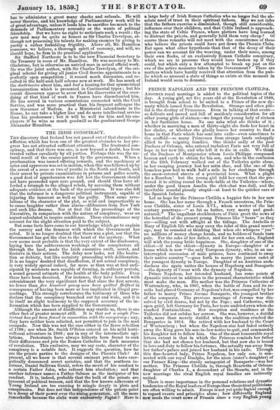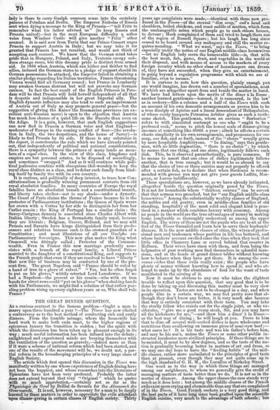PRINCE NAPOLEON AND THE PRINCESS CLOTILDA. ANOTHER royal marriage is
added to the political topics of the day. A young girl, not five years old at the Revolution of 1848, is brought from school to be united to a Prince of the new dy- nasty which issued from the Revolution. Strange and often piti- ful is the destiny of Princesses. Even in talking of that event- s° delicate and sacred and full of maidenly consideration for all other young girls of sixteen—we forget the young lady of sixteen in her Sardinian home. No one asks what she thinks of it ; whether in marrying a man of thirty-eight she finds her heart in her choice, or whether she gladly leaves her country to find a home in that Paris which has sent into exile—even sometimes to the scaffold—so many Princesses from strange lands unhappily allied to its reigning families. One thinks sadly of the poor Duchess of Orleans, we'llo entered turbulent Paris not very full of hope in her new life, and who left it to die in exile. We think of the Duchess of Montpensier whom Louis Philippe compassed heaven and earth to obtain for his son and who in the confusion of the 24th February walked out of the Tuileries quite alone, in her escaping journey lost her satin shoe, and like one of the homeless poor had to walk half a mile in her stockings through the snow-covered streets of a provincial town. What a plight for a Bourbon ! but the young girl told her escort that she pre- ferred it to sitting round the work-table at the Tuileries—where, under the good Queen Amelia the chit-chat was dull, and the inevitable scandal piously stupid—at least to the quicker ears of the Spanish Infanta. Let us hope for the Princess Clotilda a happier fate in her new home. She has her name through a French ancestress, the Prin- cess Clotilda sister of Louis XVI. whom a writer of the last century, pou;trays—" as fat as butler, very. merry and good- natured." The ungallant stockbrokers of Pans greet the news of the betrothal of the present young Princess like bears" as they are—selling out with affright at the tidings. The Arabella or Mary of English life who may envy the éclat of this grand marri- age, may be consoled at thinking that when she whispers "yes" no millions of money change hands, and no holders of funds turn pale. For the sake of her father, and for her own sake, England will wish the young bride happiness. She, daughter of one of the oldest—if not the oldest—dynasty in Europe—daughter of a house which is now "the only European dynasty, who, in an un- interrupted succession of male princes, have continued to sway their native country "—goes forth to marry the junior cadet of the youngest dynasty in Europe. Daughter of an Austrian arch- duchess she again unites the houses of Hapsburg and Bonaparte —the dynasty of Caesar with the dynasty of Napoleon.
Prince Napoleon, her intended husband, has some points of dynastic interest in addition to the personal characteristics which most make the man. His mother was the Princess Catherine of Wurtemberg, who, in 1807, when the battle of Jena and its re- sults had placed Germany at Napoleon's feet, was compelled by her father to marry Prince Jerome Bonaparte, the youngest brother of the conqueror. The previous marriage of Jerome was dis- solved by civil decree, but not by the Pope ; and Catherine, with open grief, left Germany for Pans, her tears undried even when she reached Fontainebleau. Her reception and residence at the Tuileries did not subdue her sorrow. She was, however, a dutiful wife, more than merely dutiful when the coalition crushed the Bonapartes in 1814. She retired with her husband to the Court of Wurtemberg ; but when the Napoleon star had faded entirely away the King gave his son-in-law notice to quit, and commanded his daughter not to follow him. One of the most honourable royal letters extant is that in which the Princess reminds her father that she had not chosen her husband, but that now she is bound in love and duty to follow his fortunes. She actually ran away from her father's palace and joined her husband in his exile. Through this fine-hearted lady, Prince Napoleon, her only son, is con- nected with our royal Guelphs, for the niece (sister's daughter) of our Farmer King—the sturdy antagonist of Bonaparte—was her mother. The Princess Clotilda is, through Hennetta of Orleans daughter of Charles I., a descendant of the Stuarts, and in the new marriage the rival English royal families are indirectly united.
There is more importance in the personal relations and dynastic tendencies of the Royal leaders of Europe than theoretical politicians
are often willing to admit. Europe is not yet quite logical enough to regard events and principles alone ; how differently England now reads the court news of Prussia since a very English young
lady is there to carry Guelph common sense into the crotchety palaces of Potsdam and Berlin. The Emperor Nicholas of Russia
sent when dying a me to the King of Prussia—" tell Fritz to remember what his message advised us" (to keep Russia and Prussia united)—but in the next European difficulty a softer voice from Windsor Castle will give another " Fritz " other counsel. It is said now from Turin that our Prince Consort urges Prussia to support Austria in Italy ; but we may take it for granted that Prussia has not received, and would not think of accepting such counsel. We know that the German mind takes pride that in Hungary, Poland, and Italy, Teutonic energy sub- dues strange races, but this dreamy pride is distinct from armed aid. In 1854 when Austria, which ran hither and thither to find allies, induced the German states to a pledge of support should its German possessions be attacked, the Emperor failed in obtaining a similar pledge regarding his Italian territories. France threatening Vienna would find all Germany roused ; but France in Lombardy may awaken German distrust but will not provoke any German cannon. In fact the best result of the English Princess in Pots- dam will be that Prussia will hold herself independent of all that is despotic and indispensible in her great Imperial ally. The English dynastic influence may also tend to such an improvement of Austria out of Italy as may promote general peace—but the suggestion of giving the Kaiser the Roumanian provinces (an ex- cellent anti-Russian move) is open to the objection that Austria has much less chance of a quiet life on the Danube than even on the Adige. It is a gain, however, that such English suggestions can now find in Prussia a German voice and that England— moderator of Europe in the coming conflict of four—(the revolu- tion in Italy, the two despotisms, and the house of Savoy)—is likely to find. Prussia by its side. If there is any substance in the report, it corroborates the rule which we have already pointed out, that independently of political and national considerations, there is a sympathy between the princes of many lands as mem- bers of a royal class. In the view of this class, kingdoms and empires are but personal estates, to be disposed of accordingly, and sometimes "swopped." And so it will continue while poli- tical jealousies combine with obsequious idol-worship to keep the royal class distinct as a class, and to debar each family from bind- ing itself by family ties with its own country.
It is curious, and politically of deep interest, to trace how Con- stitutionalism is gradually winning permanent converts from old royal absolutist families. In many countries of Europe the royal families have an absolutist branch and a constitutional branch, and liberty takes shelter—not to say shade—under a dynasty. The Count of Paris claims the throne of France because he is the protector of Parliamentary institutions ; the Queen of Spain wears her crown with a Cortes by her side to distinguish her from her Carlist cousin ; the King of Portugal has a similar claim ; the Savoy-Carignan dynasty is associated since Charles Albert with Italian liberty ; Sweden has a Bernadotte family royal, because they are liberals ; Belgium, Greece, Holland, and we may add Prussia and Bavaria have kings distinguished from their prede- cessors and relatives because each is the crowned guardian of a Constitution ; and most illustrious of all our Guelphs are Parliamentary Sovereigns. This new plan makes the King what Cromwell was fittingly called ; Protector of the Common- wealth. Even in France this new marriage prudently asso- ciates with a branch of the royal family, a Liberal Prince married to the daughter of a constitutional King, and suggests to the French people that even if they are resolved to have " liberty " that new line- of business may be conducted by one of the pre- sent. firm. The great Napoleon said "France should be ruled by a hand of iron in a glove of velvet." "Yes, but he often forgot to put on his gloves," wittily retorted Lord Lansdowne. If we had a Napoleon—the present or his cousin—who with an iron hands for street rows could "put on his gloves" when shaking hands with his Parliaments, we might find a solution of that rather puz- zling problem rising up every eighteen years or so, Who shall rule France ?



























 Previous page
Previous page